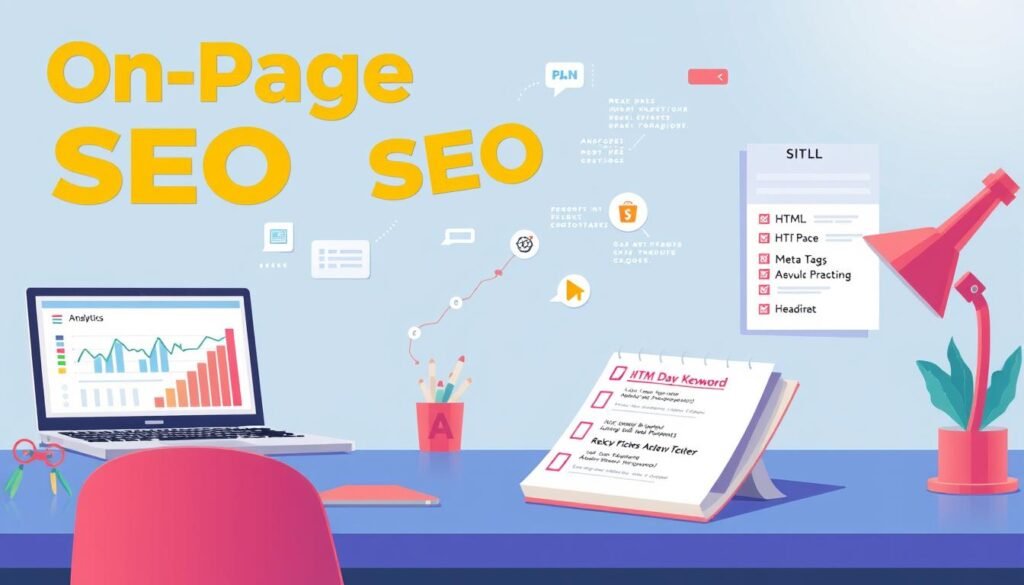SearchGPT, an AI search engine by OpenAI, is changing how we find things online. It has over 3 billion monthly visitors and 450 million active users1. This platform uses natural language to give answers that are both relevant and precise, making searching fun and quick1.
Unlike other search engines, SearchGPT doesn’t show ads and clearly tells you where it got its info1. This makes it a big deal in the digital world.
As SearchGPT gets more popular2, making your content SEO-friendly is key. It helps people find and see your content. This is great for reaching more people who want quick, accurate info2.
By learning how to optimize for SearchGPT, you can get ahead in this new search world. This way, your content can stand out and succeed.
Key Takeaways
- SearchGPT is an AI-powered search engine with over 3 billion monthly visitors and 450 million active users.
- SearchGPT offers an ad-free experience and transparent source attribution, setting it apart from traditional search engines.
- SEO is key for making your content easy to find and relevant on SearchGPT.
- Optimizing for SearchGPT boosts your online presence and connects you with users looking for fast, accurate info.
- Knowing and using SearchGPT-specific SEO tactics is vital for success in this changing search scene.
Understanding the Basics of SEO
Search engine optimization (SEO) makes your content more visible and ranked higher in search results3. Even with AI-driven search like SearchGPT, SEO is key. It helps your content get found, meet user needs, and boost your site’s authority3.
What is SEO?
SEO makes your website and content more visible in search results. It uses many techniques, like keyword research and content optimization. The goal is to make your site more accessible and valuable to your audience3.
Importance of SEO in Digital Marketing
Search engines are now the main way people find things online. For businesses that rely on search, adapting to AI-driven search is vital3. SEO boosts your online visibility, attracts the right traffic, and drives sales. It increases your chances of being found by your target customers3.
As AI-driven search evolves, SEO’s role will grow. Brands with strong SEO strategies will stand out in search results3. By keeping up with SEO trends, your business can stay visible and competitive online3.
Keyword Research Techniques
Keyword research is key to good SEO. Tools like ChatGPT help brainstorm, but premium SEO platforms like Semrush’s Keyword Magic Tool4 find the best keywords. ChatGPT is great for finding long-tail queries4 and related keywords4. Yet, its data might not always be up-to-date.
Tools for Effective Keyword Research
Doing deep keyword analysis4 is essential for content that hits the mark. Use SEO tools and ChatGPT together to find keywords that match your goals. ChatGPT helps with keyword grouping4 and spotting patterns4. But, always check your findings with traditional tools for the best results.
Analyzing Competitor Keywords
Knowing what your competitors are targeting is key5. 95% of SEO pros use this tactic5. By looking at your competitors’ keywords, you can find ways to beat them and reach more people5. 82% of SEO experts check keyword popularity5, and 68% look at how hard it is to rank for certain keywords5.
| Keyword Research Technique | Adoption Rate |
|---|---|
| Competitor Analysis | 95% |
| Search Volume Analysis | 82% |
| Keyword Difficulty Analysis | 68% |
| Long-Tail Keyword Research | 88% |
| Keyword Clustering | 70% |
Using ChatGPT and SEO tools together helps craft a solid keyword plan4. See ChatGPT as a helpful tool, not a replacement for proven methods.

On-Page SEO Best Practices
In today’s world, making your on-page SEO better is key to getting seen more online. This means working on your title tags, meta descriptions, header tags, and image optimization. These are all important steps to take6.
Title Tags and Meta Descriptions
Your title tags and meta descriptions are super important. They grab the attention of people searching online. Make your titles catchy and include the right keywords. Your meta descriptions should be short and make people want to click on your page7.
Try out different title tags to see which ones work best7.
Utilizing Header Tags
Header tags (H1, H2, H3, etc.) help search engines understand your content better. Your H1 tag should clearly state the main topic of your page. Use other tags to organize your content in a way that’s easy to follow6.
Image Optimization Tips
Optimizing your images is also important for SEO. Use descriptive file names and include relevant alt text. Also, make sure your images are compressed to speed up your page7.
Tools like ContentDetector.AI and ChatWithPDF.AI can help with image optimization. They can spot AI-generated content and turn PDFs into formats that search engines can read7.
By following these on-page SEO tips, you can make your content more visible and relevant online. This will bring more people to your website6.

Content Quality and Relevance
In today’s world of AI search, your content’s quality and relevance are key8. SearchGPT, OpenAI’s new AI search engine, shows sources and links back to original content8. This change shows how vital it is to make content that grabs attention, informs, and is unique.
Creating Engaging Content
To grab SearchGPT users’ attention8, your content must cover a wide range of topics. Use ChatGPT to help write engaging meta descriptions and plan your content9. AI tools can also help with optimizing blog posts and social media, making your content more search-friendly.
Importance of Originality
8 SearchGPT values content from trusted sources, making digital PR and thought leadership key for visibility8. To stand out, create unique, data-backed content that shows your expertise and adds value9. ChatGPT can help with finding places to guest blog or partner, but keep your content human to connect with readers.
8 With SearchGPT focusing on quality and current content8, keeping your content fresh and optimized is vital9. It’s also important to check facts, as ChatGPT’s content is based on data up to its last update9.

By making engaging, original, and relevant content, you can thrive in the AI search era8. SearchGPT lets users ask more questions, changing how marketers do keyword research and content creation8. Adjusting your content strategy and analytics will help you stay visible and relevant in the changing search world.
The Role of Backlinks in SEO
In the world of SEO, backlinks are key to showing a site’s credibility and authority. Google sees backlinks as a major ranking factor in its algorithm10. A study shows links are Google’s top ranking signal10. Businesses need to know how to get quality backlinks to boost their online presence and attract more visitors.
What are Backlinks?
Backlinks, or inbound links, are links from other sites to yours. They act as endorsements, telling search engines your content is valuable. Links from big sites like TechCrunch and Forbes have a big impact on SEO10. Also, using target keywords in backlink anchor text can help your rankings10.
Strategies for Building Quality Backlinks
Building a good link strategy means focusing on quality, not just quantity. Google says backlinks are a top three factor for rankings10. Studies show that more unique domains linking to you is better than just more links10.
Good link-building includes:
- Creating content that people want to share11
- Working with influencers and experts for content or guest posts
- Joining online communities and posting valuable content
- Using the Moving Man Method to replace broken links with your content
Getting links from related sites is more important for rankings10. Dofollow links are better for SEO, while nofollow links don’t help as much10.
By using these methods and getting diverse, high-quality backlinks, businesses can increase their organic traffic and online authority10.

Technical SEO Essentials
SEO success depends on technical aspects that help search engines crawl and index your site. Key areas include mobile optimization and site performance12.
Mobile-Friendliness and Site Speed
Mobile traffic now beats desktop, making mobile optimization vital12. Google favors mobile sites for rankings, making mobile-friendliness essential12. Fast sites also rank better, showing the need for site speed optimization12.
Technical SEO also covers crawlability. XML sitemaps and robots.txt files help search engines find and index key pages13.
XML Sitemaps and Robots.txt
XML sitemaps help search engines understand your site’s structure and content, including images and videos13. Robots.txt files control crawling, ensuring focus on key pages13.
Technical SEO is key for modern SEO, helping search engines index your site well. Optimizing for mobile, improving site speed, and managing crawlability boost your site’s performance and visibility in search results12.
Local SEO Optimization
AI-driven search engines like ChatGPT are changing how we find things online. For businesses aiming at local customers, local SEO is key14. In fact, 87% of people check Google for local businesses before visiting14. It’s vital to improve your local SEO to keep up.
Importance of Google My Business
Getting and optimizing your Google My Business (GMB) listing is critical for local SEO14. Most Google Business Profile views come from discovery searches, not direct ones14. Keeping your GMB profile current and engaging can help more people find you.
Local Citations and Reviews
Having a solid GMB presence is just the start. You also need consistent local citations and customer reviews for better local SEO14. 98% of people read reviews before visiting a local business14. Good reviews can attract more customers and increase foot traffic.
As AI search engines like ChatGPT get smarter14, your local SEO needs to keep up14. Include more conversational content to match these new technologies14. By optimizing your local search, you’ll stay visible to both old and new search methods.
“Optimizing your local SEO is no longer a nice-to-have, but a necessity in today’s digital landscape. Embrace the power of AI-driven search to amplify your local visibility and connect with your target audience.”
The Influence of Social Media on SEO
Social media and search engine optimization (SEO) work together in the digital world. Social media signals don’t directly change search rankings. But, they can help a brand show up more online and get more visitors. Facebook, Twitter, and YouTube are great for sharing content, talking to people, and making a brand stronger.
Bridging SEO and Social Media
Smart digital marketers know how to mix social media with SEO. They make content that people want to share and build a strong social media presence. This helps more people visit their websites, see their content more, and know more about their brand15.
This method is good for AI search platforms too. They use social media to figure out if a brand is important and relevant.
Social Signals and Their Impact
Social media signals like likes, shares, and comments don’t directly change search rankings. But, they can help a website do better16. Good content on social media can get more backlinks and visitors, which are key for SEO. Also, being active on social media can make a brand seem more trustworthy and visible online.
To use social media well for SEO, businesses should make real, shareable content. They should grow a true follower base and talk to their audience15. Keeping a consistent brand voice and using social media to spread their content can connect social media and SEO.
| Social Media Marketing Strategies | Benefits for SEO |
|---|---|
| Regularly sharing valuable content | Increases content visibility and engagement |
| Growing a genuine follower base | Enhances brand authority and trust signals |
| Engaging with the audience | Improves brand-customer relationships and increases social signals |
| Learning audience preferences | Helps create more relevant and shareable content |
| Increasing social media engagement | Drives more referral traffic and backlinks |
| Building brand awareness | Enhances overall brand visibility and social signals |
In conclusion, social media and SEO are closely linked but complex. By using social platforms wisely, businesses can make their brand more visible and get more people to visit their site. This helps with search engine optimization too151617.
Monitoring and Analyzing SEO Performance
Keeping an eye on your SEO performance is key to getting better and reaching your digital marketing goals. By watching important metrics and using top analytics tools, you can learn a lot. This helps you improve your SEO and beat your rivals.
Key Metrics to Track
To really check how your SEO is doing, focus on these main metrics:
- Organic traffic: Watch how many people visit your site from search engines. First-page articles get 92% of all traffic for that keyword18.
- Keyword rankings: Keep an eye on your site’s ranking for important keywords. For example, “coffee maker” gets searched 86,000 times a month18.
- Bounce rate: Look at how many visitors leave after seeing just one page. This shows if your site keeps people interested19.
- Conversion rate: See how many visitors become customers. Use Google Analytics to track this and set alerts19.
Tools for SEO Analytics
To track your performance better and make smart choices, use these top analytics tools:
- Google Analytics: Get detailed info on your site’s visitors, what they do, and how they convert.
- Google Search Console: Check how your site does in search results, including crawling and clicks19.
- Semrush: Do deep competitor analysis, track keyword rankings, and see how your backlinks affect you18.
By always watching these metrics and using the best tools, you can make smart choices to boost your SEO. Using ChatGPT for SEO can make tracking and improving easier.
| Metric | Description | Importance |
|---|---|---|
| Organic Traffic | The amount of traffic your website receives from search engine results. | Shows if your SEO is working to get more visitors and attract the right ones. |
| Keyword Rankings | Your website’s position in search engine results for specific keywords. | Helps you see how well your keyword and content plans are working. |
| Bounce Rate | The percentage of visitors who leave your site after viewing only one page. | Tells you if your content is engaging and relevant to visitors. |
| Conversion Rate | The rate at which site visitors take a desired action, such as making a purchase. | Shows if your SEO is helping your business grow in real ways. |
“Regular analysis of your SEO performance helps identify areas for improvement and adapt your strategies to evolving search algorithms.”
By always checking these metrics and using the best tools, you can make smart choices to boost your SEO. Using ChatGPT for SEO can make tracking and improving easier1819.
Keeping Up with SEO Trends
The digital world is always changing, and keeping up with SEO trends is key. With AI-driven search platforms like SearchGPT, you need to adjust your strategies. This ensures you stay competitive by matching user behavior and search engine algorithms20.
Staying Informed about Algorithm Updates
It’s important to watch for updates from search engines, like Google’s EEAT guidelines. This helps you stay ahead by optimizing your content for new search engine standards20. By doing this, you make sure your content is relevant and trustworthy for users20.
Adapting to Changes in User Behavior
Understanding how users interact with your content is critical in the AI era. Knowing their search habits and needs helps you tailor your strategies21. Adding features like voice search and multimedia can boost user experience and your search ranking21.
To succeed in AI-powered search, you need to stay informed and keep refining your approach. Using the latest AI tools can help optimize your content and improve user engagement22.
FAQ
What is SearchGPT?
Why is SEO important for SearchGPT?
How can keyword research be done for SearchGPT?
What are the on-page SEO best practices for SearchGPT?
How can content quality and relevance be improved for SearchGPT?
What is the role of backlinks in SEO for SearchGPT?
What are the technical SEO essentials for SearchGPT?
How can local SEO be optimized for SearchGPT?
What is the influence of social media on SEO for SearchGPT?
How can SEO performance be monitored and analyzed for SearchGPT?
How can one stay up-to-date with SEO trends for SearchGPT?
Source Links
- SearchGPT SEO: The Marketers Guide to AI Search – https://nogood.io/2024/08/23/searchgpt-seo/
- SearchGPT SEO, and How to Rank in OpenAI’s New Search Engine – https://seo.ai/blog/searchgpt-seo
- SEO For Search GPT: How To Optimise For Better Visibility – https://thedigitalxx.com/seo-for-search-gpt/
- How To Use ChatGPT For Keyword Research – https://www.searchenginejournal.com/chatgpt-for-keyword-research/483848/
- ChatGPT for Keyword Research: Extraction + 6 Effective Techniques – https://seo.ai/blog/chatgpt-the-ultimate-keyword-research-tool-6-examples
- ChatGPT for SEO: Ultimate Guide, Tips & Prompts | Backlinko – https://backlinko.com/chatgpt-for-seo
- How to use ChatGPT for On-Page SEO Optimization (Data-Driven Insights) – https://www.accuranker.com/blog/how-to-use-chatgpt-for-on-page-seo-optimization/
- SearchGPT: What you need to know about OpenAI’s search engine – https://searchengineland.com/searchgpt-what-you-need-to-know-446455
- How To Use Chatgpt For Seo | Brafton – https://www.brafton.com/blog/ai/how-to-use-chatgpt-for-seo/
- What Are Backlinks in SEO? & Why You Need Them – https://backlinko.com/hub/seo/backlinks
- How important are backlinks for SEO in 2024? – https://searchengineland.com/backlinks-seo-importance-442529
- Technical SEO Checklist: Optimizing Your Website’s Architecture and Performance – https://adleverage.com/technical-seo-checklist-optimizing-your-websites-architecture-and-performance/
- Technical SEO Techniques and Strategies | Google Search Central | Documentation | Google for Developers – https://developers.google.com/search/docs/fundamentals/get-started
- How to Use ChatGPT for Local SEO Strategies – https://www.thehoth.com/blog/chatgpt-for-local-seo/
- What Will Happen to SEO with SearchGPT? – https://pathmonk.com/seo-changes-searchgpt/
- AI Revolution: Highlighting How ChatGPT Can Affect SEO – https://deliveredsocial.com/ai-revolution-highlighting-how-chatgpt-can-affect-seo/
- Maximizing SEO Impact with ChatGPT: A Comprehensive Guide – https://www.semrush.com/blog/chatgpt-seo/
- Monitoring SEO Performance The Right Way: A Practical Guide – https://www.flow-agency.com/blog/monitoring-seo-performance/
- SEO Monitoring – https://www.webfx.com/seo/learn/seo-monitoring/
- SEO Trends in 2024 and How to Adapt – https://backlinko.com/seo-this-year
- Master SEO with ChatGPT: Boost Your Search Engine Rankings! – https://debutify.com/blog/hpw-to-use-chatgpt-for-seo
- SEO GPT Prompts – https://medium.com/@seo-consultant/unlock-top-seo-strategies-with-these-gpt-prompts-18219803ba76
